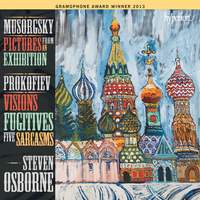Recording of the Week,
Steven Osborne plays Mussorgsky's Pictures at an Exhibition
Every now and again a disc comes along that takes me quite by surprise at how outstanding it is, and this week’s recommendation is certainly that: a new recording, due out next Monday, from pianist Steven Osborne of music by Mussorgsky and Prokofiev that has quite simply knocked my musical socks off!

Written in 1874, Mussorgsky’s Pictures at an Exhibition musically represents a series of paintings by his recently-deceased friend, Viktor Hartmann, and is conceived as an imaginary journey through an art gallery, with movements depicting specific paintings being linked by a series of Promenades as the visitor moves between the exhibits. The work is probably familiar to most people today in the orchestration by Maurice Ravel (one of several orchestrations in existence), but it was originally a suite for solo piano, as heard here.
From the very beginning of this recording it is clear that this is not going to be just a standard performance – I was initially taken aback by how brisk the opening Promenade was, almost as if Osborne imagined that the gallery was closing soon, and so the visitor had to race to see as many paintings as possible! Once I had reached the end, though, I realised how much these fast speeds serve his interpretation of the piece as a whole, allowing the movements depicting the pictures themselves to stand out as the foundations of the work (which, if you think about it, makes perfect sense, as surely the highlights of a visit to any art exhibition are the actual paintings rather than the moments when one has to walk from one to the next!).
However, I don’t by any means wish to suggest that Osborne merely tosses off these connecting movements as being unworthy of attention: his care over the smallest details of phrasing and articulation throughout suggests a highly intelligent, thoughtful interpretation that aims to be more than just a showy series of programmatic events. In his hands it becomes a proper piece of music, and when the Promenade theme returns towards the end of the final painting, The Great Gate of Kiev, it’s an extremely satisfying moment of thematic recapitulation.
Apart from this, the movement that most stands out for me has to be Bydło, Mussorgsky’s depiction of an ox as it attempts to pull along a heavy-laden cart. Osborne’s version may be the slowest I’ve heard, drawing out the pesante marking to such an extent that you really feel the struggle. Never before have I empathised to such an extent with the travails of this lumbering brute, so much so that by the end of the movement I was quite out of breath just from listening to it!
Other little touches that elevate this recording include the final flourish of Gnomus, which is so evocative that I could almost see the gnarly gnome scampering away, and the witty trills and syncopated accents in The ballet of the unhatched chicks, which were simply delightful, and had me smiling as I imagined the exploits of the fledgling fowl.
The range of dynamics Osborne achieves is also really quite something, from the relentless fff of Bydlo to the hushed pianissimo of the catacombs in Con mortuis in lingua mortua. Couple all of this with simply stunning accounts of Prokofiev’s fiendishly difficult Sarcasms and Visions fugitives (check out the third and fifth Sarcasms or the Feroce movement of the Visions to hear virtuoso playing in abundance!), and you have a disc that is a real winner. It’s not even the end of January and we already have another one of our Discs of the Year!
Enjoy!
Steven Osborne (piano)
Available Formats: CD, MP3, FLAC, Hi-Res FLAC



